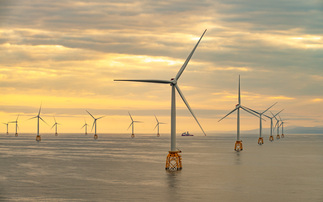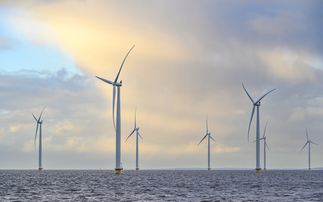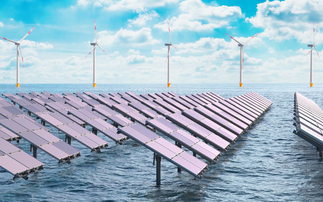BusinessGreen assesses the business implications of the pledge to 'ensure access to affordable, reliable, sustainable and modern energy for all'
Targets
7.1 By 2030, ensure universal access to affordable, reliable and modern energy services.
7.2 By 2030, increase substantially the share of renewable energy in the global energy mix.
7.3 By 2030, double the global rate of improvement in energy efficiency.
7.A By 2030, enhance international cooperation to facilitate access to clean energy research and technology, including renewable energy, energy efficiency and advanced and cleaner fossil-fuel technology, and promote investment in energy infrastructure and clean energy technology.
7.B By 2030, expand infrastructure and upgrade technology for supplying modern and sustainable energy services for all in developing countries, in particular least developed countries, small island developing States, and land-locked developing countries, in accordance with their respective programmes of support.
Progress to date
For many working in the green economy SDG7 is the big one: the goal they have the potential to make the biggest contribution to and the keystone targets that are critical to virtually every other development priority.
As such, there will be no surprises in the UN's short and sharp progress report and its punchy assessment of current efforts. "Progress in every area of sustainable energy falls short of what is needed to achieve energy access for all and to meet targets for renewable energy and energy efficiency," the UN states. "Meaningful improvements will require higher levels of financing and bolder policy commitments, together with the willingness of countries to embrace new technologies on a much wider scale."
It is an assessment that will be familiar to anyone who has kept track of the various annual updates from the International Energy Agency (IEA) and the International Renewable Energy Agency (IRENA): the energy industry is in the midst of a rapid transformation in many markets as clean energy replaces dirty incumbents, but the reality is progress has been far too slow to meet the SDGs and the targets contained in the Paris Agreement.
Renewables capacity may be growing rapidly, but steady increases in overall global energy demand meant that between 2012 and 2014 renewables share of total energy consumption did no more than inch upwards from 17.9 per cent to 18.3 per cent.
Moreover, while plummeting wind and solar costs have made renewables the default form of new power generation in a growing number of markets progress in the heat and transport sectors - which together account for 80 per cent of global energy consumption - has been much slower. In addition, there is also worrying recent evidence that progress in the power sector may be slowing. Both the IEA and oil giant BP have reported that emissions from the energy sector rose last year and while the renewables industry continues to grow overall investment levels have fallen slightly in recent years.
There has been more encouraging progress on energy efficiency, with three quarters of the world's largest energy consuming economies reducing their energy intensity, in some cases by significant margins. As a result global energy intensity decreased by 2.8 per cent in 2015 from 2014, double the rate of improvement seen between 1990 and 2010. However, the UN still warns continued policy action is required to ensure this encouraging momentum is maintained.
And then there is the on-going challenge of energy access. There has been significant progress with the proportion of the global population with access to electricity increasing from 78 per cent in 2000 to 87 per cent in 2016. However, with the bulk of communities without access to reliable power in rural areas there are signs progress is slowing. Between 2012 and 2014 access increased by just 0.3 percentage points.
According to the latest figures just under one billion people still live without electricity, and while off grid renewables and microgrids present a potential cost effective solution for rural communities in the developing world the fledgling sector remains small compared to the scale of the challenge.
Cooking and heating similarly present a major development challenge with access to clean fuels standing at 59 per cent in 2016 - an increase of just 10 percentage points since 2000. "More than three billion people, the majority of them in Asia and sub-Saharan Africa, are still cooking without clean fuels and more efficient technologies," the UN said, a scenario that leads to serious air pollution and related health issues, as well as deforestation and biodiversity loss. Higher costs, lack of access to finance, and low levels of awareness about the importance of clean fuels are all hampering the roll out of clean technologies.
Business implications
There is no hiding from SDG7. Unlike some of the other goals it requires fundamental transformation in industrialised and developing economies alike. There may be relatively few targets, but there is no business that will not be affected by the pursuit of SDG7. Efforts to provide universal affordable and clean energy will obviously impact the energy industry and related sectors such as transport and construction most, but ultimately every business will be affected by the resulting disruption.
Businesses need to consider both the direct and indirect impacts that will result from SDG7. Failure to meet the goal will make the delivery of most of the other SDGs, not to mention the Paris Agreement, all but impossible, leading to significant climate and security risks as well as stalled economic development in emerging markets.
At the same time a concerted effort to deliver on the goal could lead to huge disruption along multiple vectors in every jurisdiction. Significant energy market reforms, more robust energy efficiency standards, the wider use of carbon pricing, and the rapid integration of the energy, building, and transport sectors are all likely. Effective policies and investments could keep cost and energy security impacts to a minimum, but poorly planned or executed policies raise the prospect of higher costs and less reliable energy.
In emerging markets the trend towards microgrids provides a chance to demonstrate that decentralised energy systems can work, which could have major repercussions for incumbents that are wedded to centralised energy systems.
Business risks
The biggest business risk associated with SDG7 would arise from the failure to respond to recent sluggish progress in the transition away from fossil fuel energy. Unless the goal is broadly met economic growth in emerging markets will not be maximised and the Paris Agreement will not be honoured, leading to a significant escalation in climate risks.
However, at the same time significant risks will arise from efforts to meet SDG7, which will only be amplified for those businesses that fail to engage with the technology revolution sweeping the energy industry.
Clean energy costs may be falling rapidly, but there are still plenty of regions where policy support is required to drive clean tech deployment at scale, be it through the subsidised deployment of cleaner stoves, renewable energy contracts, or trials for marine energy technologies. Such moves could result in higher taxes, higher carbon prices, and higher energy costs for some businesses in the short term. It is also likely to require increased R&D spend amongst energy firms and heavy energy users to accelerate the development of the lower cost clean energy sources and energy efficiency gains that are required.
Similarly, more demanding energy efficiency standards will deliver cost savings for businesses, but will also increase the regulatory burden for those firms that fail to respond.
Cost, air quality, and climate-related benefits should be unlocked in the longer term by clean energy policies, but businesses are still likely to be asked to provide much of the initial capital required to drive a green industrial revolution.
There is also a specific risk for parts of the clean energy sector arising from the wording of the SDG7 targets and the indicators selected to track progress. SDG7A may call for enhanced international cooperation to "facilitate access to clean energy research and technology, including renewable energy, energy efficiency and advanced and cleaner fossil-fuel technology, and promote investment in energy infrastructure and clean energy technology". But at the same time SDG7.2 calls specifically for a substantial increase in "the share of renewable energy in the global energy mix". Nuclear power and carbon capture and storage are notable by their absence. As such proponents of a technology neutral approach to decarbonisation will argue there is a risk that alternative sources of clean energy are sidelined in favour of renewables-focused policies.
More broadly, the technology revolution already well underway across the energy and automotive sectors will fuel so-called 'carbon bubble' risks whereby investors in carbon intensive assets risk seeing their investments become stranded as a result of more competitive clean technologies and more robust climate and air pollution policies. Unless investors and regulators respond sensibly to the disruption underway in the energy and transport industry an avalanche of stranded assets could have significant implications for financial stability.
Business opportunities
It is no exaggeration to suggest the business opportunities arising from SDG7 could amount to trillions of dollars. The IEA has previously said fully implementing the national pledges made under the Paris Agreement - which themselves are inadequate for meeting the Agreement's targets and the SDGs - would require $13.5tr in energy efficiency and low carbon technology investment between 2015 and 2030. The bulk of that investment will inevitably be focused on energy infrastructure.
The flip side to the disruption that will arise as the result of the transition to a low carbon energy system is the massive commercial, economic, jobs, and health benefits on offer from the emergence of technologies that boast lower running costs, fewer polluting externalities, and potentially higher levels of energy access and security.
All businesses stand to benefit from improvements in energy efficiency that will inevitably result in lower costs and higher productivity. At the same time plummeting renewables and energy storage costs point to lower power prices in the long run, along with fewer health impacts, especially in emerging economies.
The commitment to step up R&D and support cleaner fossil fuels and energy infrastructure also suggests promising new markets for next generation nuclear and CCS, as well as critically important smart grids, even if they are not mentioned by name in the targets. Decarbonising heat and heavy industry remains a major challenge, but it again points to increased R&D spend and the potential for massive new markets as greener technologies emerge.
At the same time the related revolution in electric and automated vehicles raises the prospect of major new revenue streams for the transport sector, coupled with reduced air pollution and congestion, as well as improved services and lower running costs for customers.
More broadly, continued efforts to expand energy access and get cleaner cooking and heating fuels into developing economy communities should unlock economic growth while curbing land use impacts.
Meanwhile, astute allocation of capital and improved climate disclosures from businesses should help minimise carbon bubble risks.
At the heart of SDG7 sits one of the biggest industrial revolutions the world has ever undertaken. As such it should drive the creation of huge new global markets, with the immense business opportunities that the green energy revolution brings with it.










